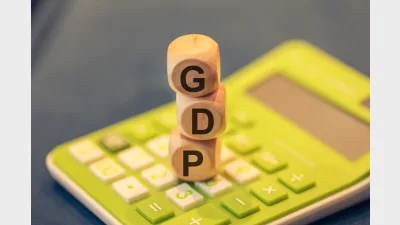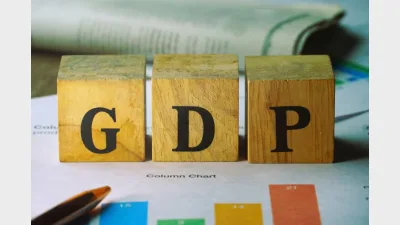Australia's 'anaemic' GDP growth sustained solely by public spending



Australia’s anaemic GDP growth data shows that government spending is more than compensating for the recession in the private sector.
Australia’s real GDP increased by a small 0.2 per cent in the June quarter, taking the annual rate to just 1.0 per cent, according to figures released by the Australian Bureau of Statistics (ABS) on Wednesday.
Outside of the pandemic, this is the slowest rate of annual growth in GDP in more than three decades.
Economists broadly expected national accounts to show a real GDP increase of 0.2 per cent on the quarter, and an annual rate dip to 0.9 per cent.
Reflecting on the GDP data, which revealed the continued growth of the government sector as a share of the economy, Treasurer Jim Chalmers praised the government’s economic management.
“These figures today are soft and subdued. They are what we expected and what the market expected. But we know people are doing it tough, growth in the economy is soft and subdued – and that is why our responsible economic management and striking all the right balances are so important,” Chalmers said.
He added that while fighting inflation is the government’s “primary concern”, it won’t be “slashing and burning” in the budget.
“What we have shown is we can fight inflation, the economy can continue to grow, albeit weakly, we can keep the labour market in relatively good nick, and we can balance all of the risks in the economy, including in the labour market,” the Treasurer said.
However, according to the shadow treasurer, Labor’s expansionary budgets are to blame for Australia’s stubborn inflation.
Speaking to the media on Wednesday, Angus Taylor accused the Treasurer of “fighting everybody and everything, except his homegrown inflation”.
“It’s very clear from the national accounts numbers that have just come out that the government’s failures are coming home to roost,” Taylor said.
“This is the sixth consecutive quarter now of a household recession, the sixth consecutive quarter of negative GDP per capita. That’s 18 months our economy has been in a household recession.”
Economic pulse ‘incredibly weak’
From an economist’s standpoint, the GDP confirmed that not only is the economic pulse in Australia incredibly weak, the economy is also two-speed.
“Economic growth in the private sector has been non-existent over the first half of 2024. It is only public spending that has kept GDP growth positive over that period,” CBA’s Gareth Aird said.
“This is an unusual situation and is not an outcome that should be viewed favourably in an environment of elevated inflation.”
For Aird, the biggest news in Wednesday’s national accounts was the weakness in consumer spending.
He highlighted that while the RBA has taken interest rates to a restrictive setting to slow demand growth in the economy, “monetary policy cannot slow the public side of the economy”.
“The national accounts indicate that the level of interest rates has clearly worked to slow activity in the private economy,” he said.
“The consumer is feeling the brunt of the RBA’s tightening … Businesses, by extension, suffer as growth in overall sales to consumers slow. Investment plans have moderated in response.”
At the same time, the government sector continues to grow as a share of the economy.
“Indeed, the lift in public recurrent expenditure has been quite extraordinary over an extended period of time,” Aird said.
Reflecting on what the implications for the RBA could be, Aird said while the overall level of economic activity is in line with the central bank’s expectations, the growth drivers are not.
“The RBA will be surprised in particular by the weakness in household consumption,” the economist said.
“Our call for the RBA to join a number of other central banks and commence an easing cycle by the end of the year requires inflation to moderate faster than the RBA has forecast and the labour market to loosen more materially.
“The runway is shortening,” Aird warned, adding that the risk to CBA’s call is that even if its near term forecasts for inflation and unemployment come to fruition, “the board does not feel comfortable commencing an easing cycle until it has seen more economic data”.
Also evaluating the data’s potential impact on the RBA, Andrew Canobi, the fixed income director at Franklin Templeton, said the data is unlikely to inspire the central bank to ease rates given government spending is more than offsetting the recession in the private sector.
“The private sector is in recession, government spending is more than offsetting this, keeping the headline numbers barely positive,” Canobi said.
Similarly, VanEck head of investments & capital markets, Russel Chesler, said: “We do not expect this will influence the RBA’s outlook on interest rates”.
“We expect GDP will remain relatively anaemic for the rest of 2024,” Chesler said. “Things should look better in 2025, where falling inflation, lower income tax and rate cuts should help improve consumer spending, thus driving a rebound in GDP.”
Notwithstanding Wednesday’s GDP print, VanEck, he said, maintains its position that Australia will experience a soft landing.
Recommended for you
Superannuation industry bodies have warned the prudential regulator that some of the more rigid proposals in its Governa...
IFM has firmly opposed any push for publicly disclosing current valuations of private market assets, saying it would “damage the financial interests of investors” and reduce appetite for infrastructure and private business investment.
Subdued GDP figures have bolstered expectations that the RBA could cut rates sooner and, possibly more aggressively, market watchers say.
Australian institutional investors plan to keep their finger on the pulse of private markets, new data has shown, with local investors aiming to further expand allocations into the sector.









